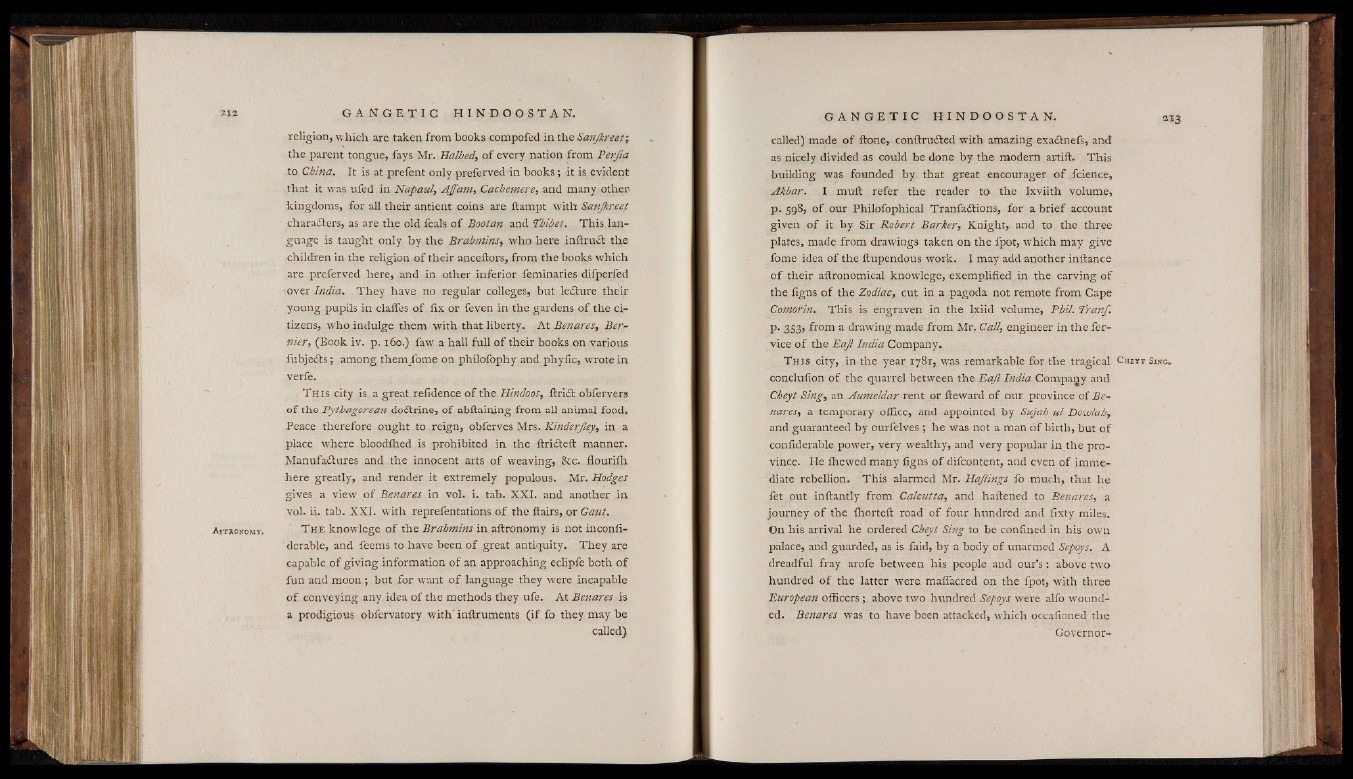
A stronomy.
religion, which are taken from books compofed in the Sanjkreei;
the parent tongue, fays Mr. Halted, of every nation from Perfia
to China. It is at prefent only preferved in books; it is evident
that it was ufed in Napaul, AJfam, Cacbemere, and many other-
kingdoms, for all their antient coins are ilampt with Sanjkreet
characters, as are the old feals of Bootan and Thibet. This language
is taught only by the Brahmins, who here inftruit the
children in the religion of their anceftors, from the books which
are preferved here, and in other inferior feminaries difperfed
over India. They have no regular colleges, but leilure their
young pupils in claffes of fix or feven in the gardens of the citizens,
who indulge them with that liberty. At Benares, Bernier,
(Book iv. p. 160.) faw a hall full o f their books on various
fubjedts; among themfome on philofophy and phyfic, wrote in
verfe.
T h i s city is a great refidence o f the Hindoos, ftridt obfervers
o f the Pythagorean doftrine, of abftairfing from all animal food.
Peace therefore ought to reign, obferves Mrs. Kinderjley, in a
place where bloodihed is prohibited in the ftridleft manner.
Manufailures and the innocent arts o f weaving, &c. flourifh
here greatly, and render it extremely populous. Mr. Hodges
gives a view of Benares in vol. i. tab. XXI. and another in
vol. ii. tab. XXI. with reprefentations o f the flairs, or Gaut.
T h e knowlege of the Brahmins in aftronomy is not inconfi-
derable, and feems to have been o f great antiquity. They are
capable of giving information of an approaching eclipfe both of
fun and moon ; but for want o f language they were incapable
o f conveying any idea of the methods they ufe. At Benares is
a prodigious obfervatory with'inftruments (if fo they may be
called)
called) made of ftone, conftrudled with amazing exadtnefs, and
as nicely divided as could be done by the modern artift. This
building was founded by that great encourager o f fcience,
Akbar. I muft refer the reader to the lxviith volume,
p. 598, of our Philofophical Tranfadlions, for a brief account
given o f it by Sir Robert Barker, Knight, and to the three
plates, made from drawings taken on the fpot, which may give
fome idea of the ftupendous work. I may add another inftance
o f their aflronomical knowlege, exemplified in the carving of
the figns of the Zodiac, cut in a pagoda not remote from Cape
Comorin. This is engraven in the lxiid volume, Phil. Tranf.
p. 353, from a drawing made from Mr. Call, engineer in the fer-
vice of the Paß India Company.
T h i s city, in the year 1781, was remarkable for the tragical C h e y t Sin s ,
conclufion of the quarrel between the Paß India Company and
Cheyt Sing, an Aumetdar rent or fteward of our province of Benares,
a temporary office, and appointed by Sujab ul Dowlah,
and guaranteed by ourfelves ; he was not a man o f birth, but of
confiderable power, very wealthy, and very popular in the province.
He fhewed many figns o f difcontent, and even of immediate
rebellion. This alarmed Mr. Haßtngs fo much, that he
fet out inftantly from Calcutta, and haftened to Benares, a
journey of the fhorteft road of four hundred and fixty miles.
On his arrival he ordered Cbeyt Sing to be confined in his own
palace, and guarded, as is faid, by a body of unarmed Sepoys. A
dreadful fray arofe between his people and our’s : above two
hundred of the latter were maflacred on the fpot, with three
European officers ; above two hundred Sepoys were alfo wounded.
Benares was to have been attacked, which occafioned the
Governor